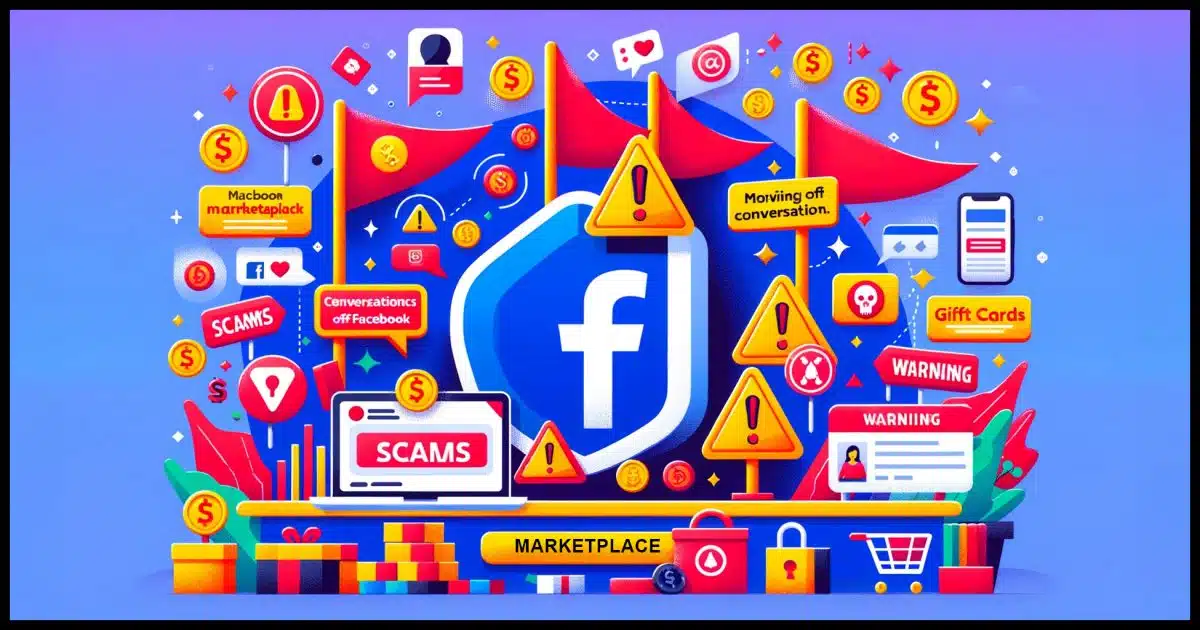These are major red flags.

As Facebook Marketplace gets more use, it also gets more scams. It’s a popular place to buy and sell, which makes it more profitable to scam there as well.
There are several things to look for, but in this article, I’m going to focus on the concept of accountability and what scammers do to avoid it.

Facebook Marketplace scams
Facebook Marketplace scams often involve avoiding accountability. Red flags include being asked to move conversations off Facebook, insistence on using cryptocurrency or gift cards, and reluctance to accept secure, traceable payment methods like credit cards. Be skeptical: if it seems too good to be true… well, you know the rest.
Stay on Facebook
One of the steps many scammers take is to ask you to take your conversation off Facebook. They usually have some plausible-sounding reason to do so.
They might suggest using secure messaging apps like Telegram, Signal, or even WhatsApp, even though that’s owned by Facebook.
By moving to a different platform, they’re no longer accountable to Facebook’s terms of service, penalties, or possible identification. You’ve moved the conversation from a structured platform with policies to a rules-free conversation between anonymous individuals. On Facebook, there’s a shred of possibility of consequences for the scammer if caught. Outside Facebook, there is none at all.
This applies to many different scams, not just those on Facebook Marketplace.
If you connect on one platform, like Facebook, and are asked to move to another, it’s a red flag.
Help keep it going by becoming a Patron.
Use real money electronically
This sounds kind of backward, but the bottom line is that transferring money electronically (ideally paying with a credit card) is safer than what many scammers ask for: Bitcoin or other cryptocurrencies.
The reason to avoid this is accountability. If you pay with crypto, it can be practically impossible to trace where the money goes once paid, and there’s zero chance of getting your money back. Account-to-account bank transfers can also be abused.
The safest approach is to insist on using a credit card. Cards (or services like PayPal) typically include some protection. Check with your bank about what protections may or may not be included when you use a debit card.
If the seller insists on cash, a bank-to-bank transfer, or especially cryptocurrency — particularly if they insist on payment before delivering your purchase — that’s another big red flag.
Never, ever, use gift cards
This is so common and so important that it deserves its own mention apart from the previous point.
Scammers often request payment in gift cards. They’ll ask you to purchase gift cards for some store or other business and then send those cards (or the card numbers) to them as payment.
Gift cards have no accountability. They are exactly like cash and cannot be recovered once redeemed by the recipient. This is why they’re so common in so many different scams. Many people may not be capable of dealing with cryptocurrency, but gift cards are easy and ubiquitous.
Using gift cards is so common in scams, including Facebook market scams, that many retailers instruct their salespeople to question large purchases of gift cards in case it’s a scam in progress.
If a seller requests or insists on gift cards, it’s a huge red flag.
If you get scammed
Scammers use many different techniques when posting in places like Facebook Market, but those are some of the most common and easy-to-recognize red flags.
If you get scammed:
- Stop communicating with the scammer, period.
- Report the scam to Facebook.
- Consider reporting the scam to your local authorities.
- Check with the payment method you used — your bank, credit card company, Paypal, or whomever — to see if you have any recourse.
Facebook offers additional tips on this page about Marketplace scams.
Do this
The golden rule is this: if it sounds too good to be true, it’s probably not true. In the world of scams, that’s usually money for nothing, absurdly low prices for otherwise costly items, or attempting to sell something that doesn’t exist.
When in doubt, it’s always acceptable to say, “I know there are a lot of online scams. Can you take a credit card? Stay here on Facebook?” etc. If they balk, that may also be a red flag.
Skepticism is by far the best approach when dealing with Facebook Marketplace purchases.
(Do you have your own techniques to avoid scams? Let us know in the comments!)
Subscribe to Confident Computing! Less frustration and more confidence, solutions, answers, and tips in your inbox every week.





This article applies to other platforms, such as Craig’s List, eBay Classified Ads, and any person to person sales website.
I’d also call any request for cryptocurrency a scam. There’s no way a legitimate seller would insist on cryptocurrency. They may accept it, but insisting on it can only mean it’s a scam. Insisting on Bitcoin makes it more complicated to buy the product and would result in fewer sales. No serious company would do that. Only scammers would, because they don’t want to be traceable.
For MONTHS/years now, I’ve reported obviously fraudulent ads for ‘Ultra Speed Portable SSD’ – ‘High Speed Portable storage with Large Capacity’ – selling for example: 16TB for $69.99.
Any informed consumer would know that this is MUCH (exponentially) cheaper than REPUTABLE SSD providers – Samsung, Kingston etc. Hence obviously ‘too good to be true.
Nonetheless ALL of my attempts to inform FB of the obvious fraud were answered with ‘this ad doesn’t go against our Advertising Standards’.
While FB isn’t alone in enabling fraud purveyors, they are culpable in my opinion in not doing more than cursory scrutiny of their advertisors.
Another big scam right now is someone requesting your phone number for you to receive their ‘code’ to send back to them to prove you are a real person. They will use that code to try and sign up to various websites such as gmail.
If they have photos of an item they are selling, ask for a new photo of the item with a piece of paper with your name and the day and date, of the item they are “selling”. If they do send a photo as requested, zoom in on that photo and check that the writing hasn’t been photo-shopped either.
A lot of the FB collectibles groups got hit this past holiday season with all of these scams. When it’s a private group, it’s easier to weed out these types of people. The public groups, anyone can join without answering the questions, and the scammers had a field day. Sellers and buyers were constantly asking for help on how to get their money back or the items they had already paid for.
Another one is someone insisting they can on only accept Paypal Friends and Family, for tax or any other reasons, as payment. ONLY use Goods and Services as you have better protection if the sale goes bad.
Be careful with any pay app. Look into them to see what protections they may offer. Many of them don’t have any protections at all.
I occasionally sell on FB Marketplace and am often contacted by scammers wanting to pay by check for more than the item price and then have me send them the difference. Or by a payment app like VENMO, then I get an email that the payment won’t go through because I don’t have a business account so I have to send them $500 to get set up. I haven’t fallen for any of these. BUT!!! The other day I was contacted by a buyer who wanted to send me a code to prove I was real and to tell him the code (just as Peggy described). The code I got was for Google Voice I think. Before I could think about it I sent him the code. SO STUPID!!! Do you think I am in any danger because of this?
Yes. Change the password to your Google account.
. . . and set up 2FA, if you have not done so yet!
Not specifically for FB Marketplace but applicable to many types of scams:
I set my phone to silence callers that aren’t in my contacts, and I ignore all silenced calls. If they leave a message I listen to it and if it isn’t something I’ve expressed interest in, I delete it.
When I get a text message asking me to call a number or link to a web site, I call the company’s main number or web site, not the one in the message.
Leo has some excellent advice on verifying that an email address or web link actually connects to the outfit you think it does. I follow those guidelines closely.
I’ve sold many things on eBay, Craigslist, Marketplace and Nextdoor. I’ve found that people will waste your time with nonsense email and text messages. Now I insist that potential buyers call my home phone number. I find the ones who call are serious buyers. The others stop sending messages.
My solution to avoiding Facebook Marketplace (or any) scam is simple. I use Facebook for one purpose, and one purpose only – to maintain contact with friends and family – period. I don’t join groups, and I don’t buy/sell anything on Facebook Marketplace, and I never use any of the other features/services it offers (DMs excluded). When I want to get anything, I go to a known/trusted seller (Amazon, etc.) to find what I want. I use the Internet to search for specific products for an idea of cost, but I never make purchases from sites I don’t already know/trust. You may ask, “How can a new site become known/trusted”, and I’ll answer, “I’d rather remain safe from scams than help some new entrepreneur become known/trusted”, although I may consider making a single, low-cost purchase, just to see how trustworthy they are.
I am skeptical, very skeptical about everything on the Internet, and you should be too. The Internet is much like the Wild West from days of old. Law and Order are ineffective, or non-existent. You’re on your own out there. Everyone on the Internet is a stranger, until you can adequately confirm that thy are who they claim to be. Everything on the Internet is created by strangers, and you cannot know their motivation for producing their creations. You should never believe anything from the Internet, until you can confirm its validity for yourself, using other/different information sources, especially if it reinforces your beliefs/ideology.
My2Cents,
Ernie (Oldster)
I wouldn’t compare he Internet with the wild west. There was a lot more law and order in the wild west than movies lead us to believe. I’d venture to say that there were dozens more movies about shootouts in the territories than ther wereshootouts in the territories.
This advice applies not only to Facebook Marketplace, but any website that sells stuff. One safeguard in Europe is to give them your bank information and give them a direct debit authorization. It sounds counterproductive, but if you find it was a scam, the banks allow you to reverse take the money back within 60 days. Check your account at least once a month.
I listed a free sofa on fm and got 89 replies asking if it was available. I answered a few and they said they needed transport and would get back to me but never did. Some gave time of pickup but never showed! Is this a scam but to what end?